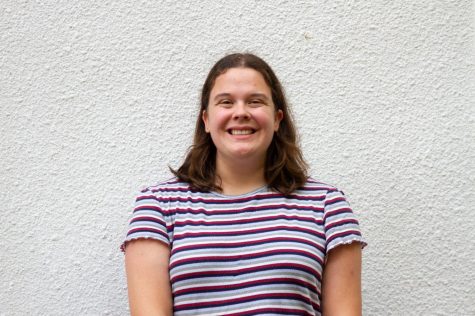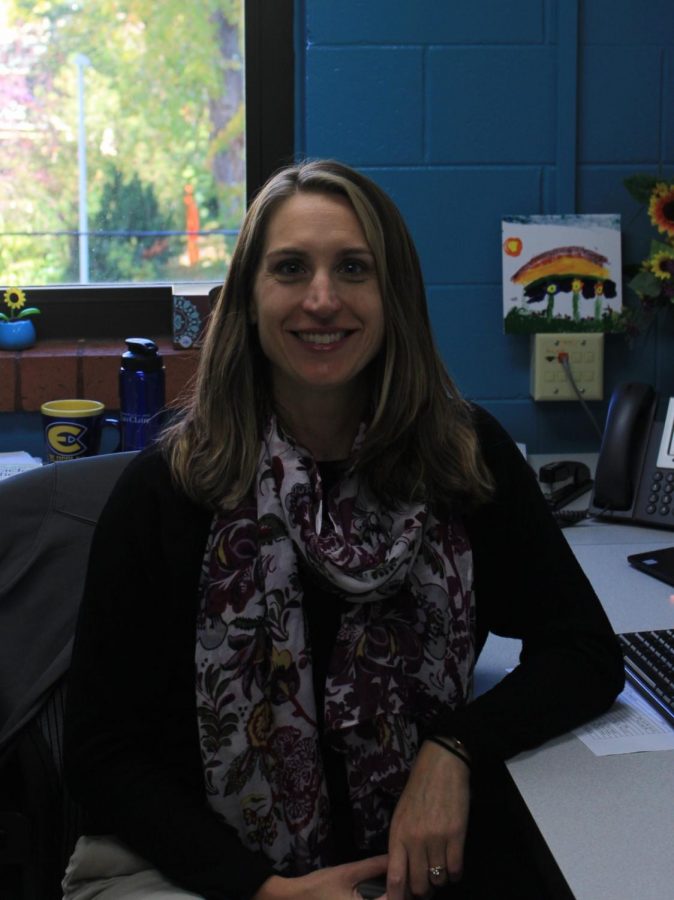Researching to save lives
Jennifer Muehlenkamp shares her findings on non-suicidal self-injury both on and off campus to help spread awareness about the topic
More stories from Ta'Leah Van Sistine
Photo by Morgan Burke
Jennifer Muehlenkamp, a professor in the psychology department at UW-Eau Claire, does research on nonsuicidal self injury in hopes of saving lives
A simple Google search reveals that there are currently 10,190 citations of Jennifer Muehlenkamp’s research.
As a professor in the psychology department at UW-Eau Claire, Muehlenkamp said she has been conducting research about non-suicidal self-injury for many years and has been sharing her findings with teachers, guidance counselors and other school administration.
According to an article that Muehlenkamp co-authored, NSSI “is defined as directly and intentionally inflicting damage to one’s own body tissue without intention of suicide and not consistent with cultural expectations or norms.”
Even with Muehlenkamp’s research being widely recognized and referenced, she said it is more fulfilling to know that her work could make a difference in someone’s life.
“To be able to both do the science and apply it in a way that has a direct positive impact — knowing there’s a direct positive impact — is so much more rewarding than any publication that I might get,” Muehlenkamp said.
Her interest in NSSI, she said, originally stemmed from an internship she did with a county social work agency in the suburbs of St. Paul, MN where the person she was working with interacted with young adults and adults who struggled with self injury.
However, Muehlenkamp said another personal experience also contributed to her interest in exploring NSSI.
“I also had a friend in high school who had struggled with self-injury a little bit and at the time, I was in high school (and) it was not as well known in terms of a behavior that people struggled with,” Muehlenkamp said. “And so all that together just kind of piqued my interest.”
Once she began attending grad school, Muehlenkamp said she noticed that self-injury had not been significantly researched.
“There (were) people who … studied suicide, but a lot of times self injury was kind of collapsed in with suicidal behavior,” Muehlenkamp said. “I had learned through reading in other things that it was a ‘separate behavior’ and so that’s why I decided to start studying it as a separate behavior.”
Sierra Dortch, a fifth-year biology and psychology student, said she has worked on several projects with Muehlenkamp and believes research about NSSI is important because of the lack of literature on the topic.
“Some of the studies don’t clearly define the difference or the relationship between NSSI and suicide attempts or ideation,” Dortch said. “Her studies are furthering the field as a whole by adding novel literature to the field that may be more accurate than past studies.”
Muehlenkamp said many schools struggle with how to best help youth who are struggling with NSSI, so she has been providing workshops, trainings and seminars for school personnel to help them become more aware of these behaviors and how to respond to them.
For these informational sessions, workshops and trainings, Muehlenkamp said she travels to the schools or goes to a designated place where several individuals who are representing different schools will meet with her.
She said she typically does the trainings with school guidance counselors, social workers or psychologists to provide them with clinical tools, such as what they need in order to come up with the most beneficial plan for helping a student.
“I’ve consulted with some schools to help them develop assessment protocols … , so it really helps them get the right information,” Muehlenkamp said. “I’ve also provided brief guidance about maybe some brief supportive interventions they can do in the school.”
Muehlenkamp said she is currently finishing up a study that investigates the reasons why some people who engage in NSSI might become suicidal. She said this information will be used to inform clinicians, so they notice those specific features or signs and can hopefully prevent an attempt or a death by suicide.
In addition to sharing her research with schools, Muehlenkamp said she also works with students from a wide variety of disciplines to work on not only her own projects, but also the ideas the students have.
Muehlenkamp also said she and students have worked to implement mental health outreach and suicide prevention programs at UW-Eau Claire.
Among employment opportunities in Student Health Services, the Suicide Prevention Research Collaborative and the Lifesavers Suicide Prevention Program, she said there are several campus organizations and groups that discuss similar topics to Muehlenkamp’s research.
“I think it’s important for (people) to know that me, and the people working along with me, are trying to make a difference on our campus here too,” Muehlenkamp said.
For Muehlenkamp, she said her ultimate goal for her research on NSSI is to save lives and to make the transition from adolescence to adulthood easier for people, so they are able to enjoy life, contribute to society and maximize their potential.
“I figure (if) one life (is) saved, (then) years and years of work is worth it,” Muehlenkamp said.
For additional resources, support and guidance, Muehlenkamp said she recommends the Self-injury & Outreach website and the Self-injury & Recovery Resources page.
Van Sistine can be reached at [email protected].

Morgan Burke is a fourth-year photography and multimedia communications student. This is her fourth semester on The Spectator, and first as Multimedia Editor. In her free time, she loves to make hyper-specific Spotify playlists and eat avocado toast.











